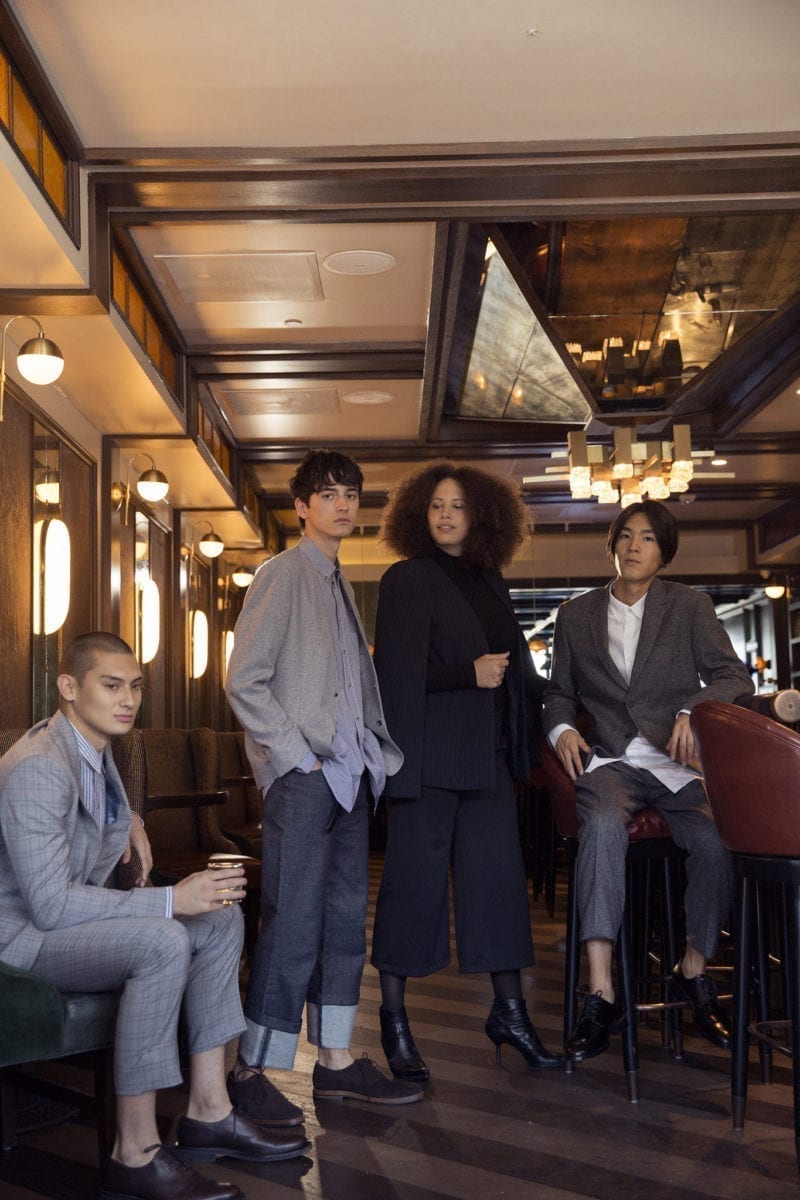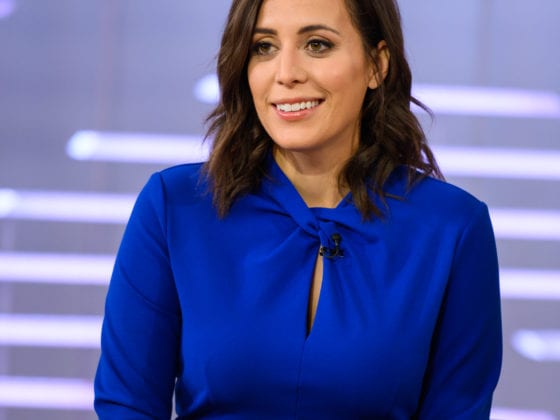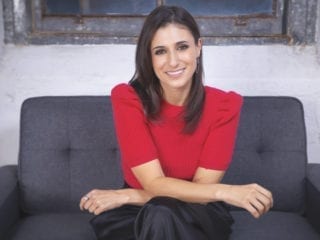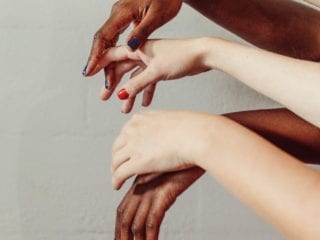A Roundtable With Darling offers real talk from a few of our writers. This Q&A series will take an issue and share the writers’ personal experience and lessons learned. The hope is to create a space of connection and transparency.
Our current political climate is extremely divisive. This seems to be only amplified by the Internet Age and social media. Unfollow. Flag. Shame. Mute. Berate. Label. Dismiss. Shut down. In a moment in history where everyone seems more focused on being right and being heard, it seems that we have lost sight of the art of true dialogue—to listen in order to learn and to empathize with the experience of others.
For our newest edition of “A Roundtable With Darling,” we are delving into a sensitive topic in hopes of bringing wisdom, empathy and understanding through honest dialogue. Can we engage with people we disagree with in a healthy way? How can we have honest, yet hard conversations? Is this possible in 2020?
Grab a seat at the table with us as a few Darling writers share their thoughts on this important topic:
What is your opinion about the current state of the ability to engage in healthy rhetoric and dialogue in America?
“Our present inability to engage in any kind of healthy or rational dialogue is sad. We are in a crisis of understanding that I, at times, am unsure of how we can overcome and return to a common table.” – Allison Antram, Lexington, Kentucky
“Healthy rhetoric and dialogue is hard to come by at the moment. We’re living in possibly one of the most important, yet divisive elections in history. We have also had a year of unprecedented confusion and tragedy and a re-surfacing of important justice issues. Most of this has taken place online. People are exasperated from the onslaught of information and opinions coming their way. The ability to engage in a health rhetoric is probably, in my opinion, at an all time low.” – Nadia Hussain, London, UK
“Currently, few people in America have the ability to engage in healthy rhetoric and dialogue. We are on the defensive. We want to talk over each other instead of listen. We are more worried about being right than being respectful.” – Emily Garcia, Saltillo, Mexico
We want to talk over each other instead of listen. We are more worried about being right than being respectful.
“It feels like America has forgotten that healthy dialogue is a vital part of individual and societal growth. The tendency has become to enter a conversation with the intent to be right, rather than to learn from one another and go deeper, so that we can all evolve and come together.” – Shelby Cormier, Carlsbad, California
Why do you think hard conversations and conversation amongst opposing viewpoints are difficult to have?
“At the core is a general loss of empathy and the ability to honor each other as human beings. In part due to the digital gap created by social media, we are able to gather information, make quick judgments and participate in discourse without having to acknowledge the humanity of the people on the other side of the screen.” – Allison Antram
“Our opinions carry energies. They all originate from an experience and are what we interact with in difficult conversations. I try to make sure the weight behind any opinion or belief I hold doesn’t take over in the conversation, and that is fundamentally respectful, kind, compassionate and empathetic.” – Nadia Hussain
“There is the possibility that we might offend them, which makes it difficult to relax in conversation. If the person we are talking to is different from us, then we might not know how to start or sustain a conversation. We might also be afraid that our own convictions or morals are not strong enough to engage with someone with an opposing viewpoint and that engaging with someone different might ‘change’ or ‘corrupt’ us.” – Emily Garcia
“Current issues are all really personal. When we are having conversations with people with opposing viewpoints, we are discussing issues that are wrapped up with our health and our future, and especially as a Black woman in this climate, our humanity. I think when we are discussing such heavy and personal concepts, the most important factor is the desired outcome. If we aren’t committed to seeing each other first as humans and then diving in to grow together in conversation, then these conversations end before they even begin.” – Shelby Cormier
If we aren’t committed to seeing each other first as humans and then diving in to grow together in conversation, then these conversations end before they even begin.
Has there ever been a time in your life where you had to have a conversation with someone you disagree with? How did that go?
“During my senior year of college, I was an editor for our university’s paper, and, although I spent much of my college years trying to avoid politics altogether, I was put in a position of bringing balance to a conversation being had across campus via the student paper. I largely sat out of the conversations in our newsroom and listened instead. I found that everyone had very genuine and worthwhile reasons behind what they believed, and everyone had something I could learn from.” – Allison Antram
I found that everyone had very genuine and worthwhile reasons behind what they believed, and everyone had something I could learn from.
“The only times in my life when I have sought out this kind of conversation is because a) there was a misunderstanding or b) to repair the relationship. These have been few and far between. I rarely seek those conversations out because of the need to be right. They are usually because the relationship was compromised. However, I frequently find myself in conversations with people who disagree with me or have a different approach. Last month, I found myself in a conversation with a family friend who made a complete U-turn on something we used to connect on a year ago.” – Nadia Hussain
“I majored in intercultural studies at a college in Southern California. In my college classes, I had to interact with people from different subcultures in and around Los Angeles and that was how I ended up becoming friends with a girl whose family had immigrated to the U.S. from the Middle East.
One night, after we had been friends for a few months, she asked about my religion. Then, I listened as she told me about hers and why her faith was important to her. We said goodbye to each other that night just as we always did, with a big hug and the promise to see each other again soon. That was the first time that I knew that it was possible to still love and respect someone with whom I disagreed.” – Emily Garcia
“During the 2016 election, I had a conversation with a friend who wanted a different outcome than I did. The conversation was very short, and we actually were both extremely flustered in our responses. I realized then the importance of prioritizing the goal of the conversation, first and foremost. If the goal of the conversation is not to understand one another and learn from one another it can quickly become an unproductive debate.” – Shelby Cormier
Is it harder or easier to engage with someone you know personally whose beliefs are different from your own? Why?
“Optimistically, I would like to say knowing someone’s heart eases the burden of those conversations. Realistically, however, I think it is more difficult. With people with whom we have actual relationships with, we often have shared values or ethics, and seeing someone’s vastly differing application of those ideas can be hard to swallow. The redeeming possibility is that within a relational context, there is ideally a level of civility that becomes necessary.” – Allison Antram
“My brother and I frequently differ in opinion and approach, but it’s easy because there is trust and respect between us. My parents raised me to think independently and engage respectfully, which worked out to be a good combination. It has meant that disagreement doesn’t equal conflict, which means I can engage with people I really love, even if we really disagree.” – Nadia Hussain
Disagreement doesn’t equal conflict, which means I can engage with people I really love, even if we really disagree.
“I think it is harder to engage with people I know whose beliefs are different from my own because I am scared of offending them or trying so hard to be ‘politically correct’ that it is impossible for conversation to flow.” – Emily Garcia
“It goes back to the desired outcome of the conversation—whether or not we are committed to valuing the humanity of one another in conversations and tread with curiosity rather than judgment. If the commitment to a healthy dialogue is in place, a conversation with a complete stranger or a best friend can be healthy and productive. If not and you are conversing with somebody you know personally, it can be much harder because we long to feel seen and heard by those in our circle.” – Shelby Cormier
What is the value of having friends and community with different beliefs, opinions and ways of thinking?
“Having a community that is both willing to hold differing opinions and willing to engage in civil conversation can be one of the most formative and beneficial practices in our present cultural moment. It forces us out of our echo chambers, out of our comfort zones and into a space where we must be willing to let conversation mold us, rather than use it as a weapon. Communal conversations, such as these, hold the greatest potential to bring us back to common ground.” – Allison Antram
Communal conversations . . . hold the greatest potential to bring us back to common ground.
“The value of this cannot be overstated really. What a boring world it would be if we all had congruent beliefs and opinions! As a woman of faith, there’s an undeniable unity and synergy with other people of faith that is unmatched by those who don’t share the same world views, but if we limit ourselves only to friendship where our beliefs are homogenized, then we won’t learn anything new.” – Nadia Hussain
“I have learned so much from friends and communities that think differently than me. My aforementioned Middle Eastern friend in college disarmed me with her kindness and hospitality. Living in Mexico for seven years has given me friends and neighbors who have loved me unconditionally, even when I forget essential Spanish words and always leave their parties early.” – Emily Garcia
“Having friends and a community with different beliefs and opinions is so valuable. If we fill our circles with a wide range of views, experience and perspectives, our realities expand. We are able to see the world with greater perspective than we could ever have conjured up from just our own personal experience.” – Shelby Cormier
When, if ever, is the time to disengage with someone whose views are fundamentally different from your own? Is there a cut off line?
“We have to value human beings and our relationships more than we value being right. Sadly, sometimes that means engaging in difficult conversations is not an option—not simply as a means of avoiding difficulty, but to choose the option that speaks to our boundaries and limitations.” – Allison Antram
“I would say it’s better, healthier and wiser to disengage from the conversation, rather than the person. You can end the conversation because of fundamental differences, but it doesn’t mean you have to end, cancel or cut off the person.
The ‘cut-off line’ in conversation usually comes when you hit a brick wall. Disengage from the conversation but find another alley of connection with that person. We’re not just minds. We are hearts and souls, too. There’s plenty of ground to connect on without needing to cut off!” – Nadia Hussain
“When there is more arguing being done than discussing and when the conversations are more frustrating than edifying, I think it would be time to disengage with someone.” – Emily Garcia
“It has taken me a long time to honor and love my identity as a Black biracial woman more than I honor and respect other people’s views of me. Right now, I find it extremely hard to be in situations where anything related to my identity is debated as a ‘topic.’ In the moments where it feels like I have to choose between honoring my identity or continuing to converse, I choose not to lean into that conversation. It’s liberating that I get to choose which conversations to lean into. It feels like I am honoring myself in a way that is sacred.” – Shelby Cormier
It’s liberating that I get to choose which conversations to lean into. It feels like I am honoring myself in a way that is sacred.
What role has social media played in the ability to dialogue?
“Social media has relegated us to and, then, reinforced our personal echo chambers. While it can inform, it usually informs selectively. Then, it enables us to limit the ‘other side’ of the conversation to a simple stereotype and keep scrolling if we don’t want to engage. In order to heal and grow in our ability to dialogue, it will become increasingly necessary to break down the walls of the boxes social media has—intentionally or not—put us in, and find accurate and diverse sources and tangible tables to gather around.” – Allison Antram
“I love that social media is one giant, global forum for dialogue, but it has played a huge role in negative dialogue too. Unfollowing, blocking, reporting, hateful comments and tags are all passive aggressive means of trolling one another into conformity and, sadly, this is the opposite of real time dialogue.” – Nadia Hussain
Unfollowing, blocking, reporting, hateful comments and tags are all passive aggressive means of trolling one another into conformity…and the opposite of real time dialogue.
“Social media has given us an outlet to voice our opinions. Conversely, it has made it easy to see the opinions of our online ‘friends’ and the people we follow. This is not necessarily bad, but, in some instances, it has made it harder to dialogue.” – Emily Garcia
“Social media has been an amazing resource to understand multiple perspectives, but it often stops there. I think it’s great to use social media as a place to display your support for certain issues that matter, but I also think it is making it so hard for us to go deeper. We are filling in the gaps where there should be intentional conversations with short tweets and reposts.” – Shelby Cormier
Finally, what is your hope for America in this time of heightened divisiveness?
“In our current culture of divisiveness, we find ourselves with a need for genuine hope. This means acknowledging the mess, engaging with it and looking for empathetic solutions, all the while linking arms with as many people as possible.
There was a More in Common study several years ago that uncovered the tribalism that has swallowed American politics. It argued that we had more in common than we realized. It also illuminated what it calls the “exhausted majority,” the shared experience of the majority of Americans who fall between the loudest extremes. This means, despite whatever climate may grace our newsfeeds, the majority of people want civility and a middle ground. If we were to leverage this reality and engage with empathy, rather than cowering in exhaustion or apathy, then we could reshape the conversation.” – Allison Antram
The majority of people want civility and a middle ground.
“When Americans are at their best they serve, help and support one another because there is ‘plenty to go round’ so to speak and because everyone has a seat at the table. There are equal opportunities. There’s fair reward for hard work and a radical belief in the individual. My hope is that Americans begin to recapture this way of living—wielding it with love, not hate and division.” – Nadia Hussain
“I hope that Americans can begin to get to know people from different cultural, religious, geographic and socioeconomic backgrounds by observing, asking questions and listening. If we can do that lovingly and respectfully, then I know that things will change.” – Emily Garcia
“My hope for America is to value one another, each and every one of us. My favorite quote by Mother Teresa is, ‘If we have no peace, it’s because we have forgotten that we belong to one another.’ Right now, we have forgotten, and my hope is that through intentional conversation, and a commitment to empathy, we can come home to each other.” – Shelby Cormier










